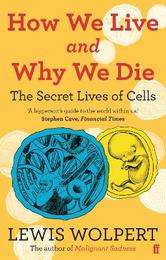
|
How We Live and Why We Die: the secret lives of cells
Paperback / softback
Main Details
| Title |
How We Live and Why We Die: the secret lives of cells
|
| Authors and Contributors |
By (author) Lewis Wolpert
|
| Physical Properties |
| Format:Paperback / softback | | Pages:256 | | Dimensions(mm): Height 198,Width 126 |
|
| Category/Genre | Popular science
Cellular biology (cytology) |
|---|
| ISBN/Barcode |
9780571239122
|
| Classifications | Dewey:571.6 |
|---|
| Audience | |
|---|
| Edition |
Main
|
|
Publishing Details |
| Publisher |
Faber & Faber
|
| Imprint |
Faber & Faber
|
| Publication Date |
1 April 2010 |
| Publication Country |
United Kingdom
|
Description
Cells are the basis of all life in the universe. Our bodies are made up of billions of them: an incredibly complex society that governs everything, from movement to memory and imagination. When we age, it is because our cells slow down; when we get ill, it is because our cells mutate or stop working. In How We Live and Why we Die, Wolpert provides a clear explanation of the science that underpins our lives. He explains how our bodies function and how we derived from a single cell - the embryo. He examines the science behind the topics that are much discussed but rarely understood - stem-cell research, cloning, DNA - and explains how all life evolved from just one cell. Lively and passionate, How We Live and Why we Die is an accessible guide to understanding the human body and, essentially, life itself.
Author Biography
Lewis Wolpert is a distinguished developmental biologist and an accomplished broadcaster. He is Emeritus Professor of Biology as Applied to Medicine at University College, London. A CBE and a Fellow of the Royal Society, he was chairman of the Committee on the Public Understanding of Science for four years. He is the author of, among others, The Unnatural Nature of Science, Malignant Sadness and Six Impossible Things before Breakfast.
Reviews'The secret lives of cells' shouldn't be kept a secret, and Wolpert makes a good start at breaking the silence. . . . Impressively up to date.--Helen Pickersgill
|